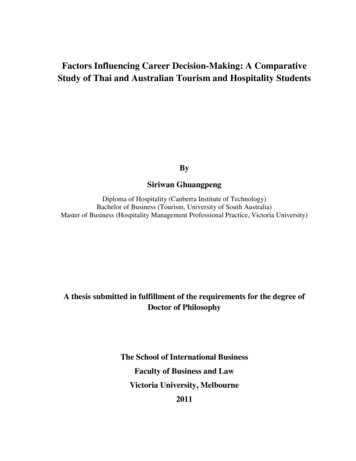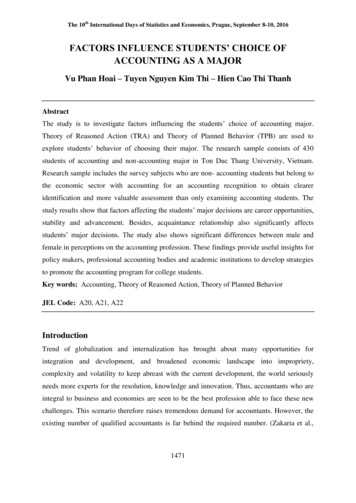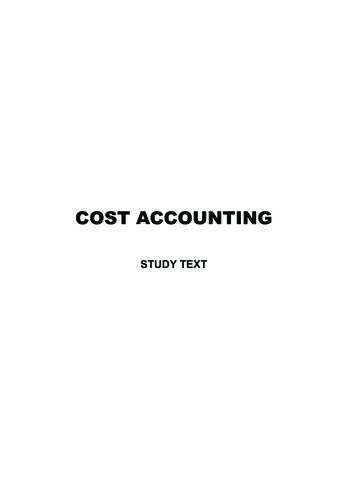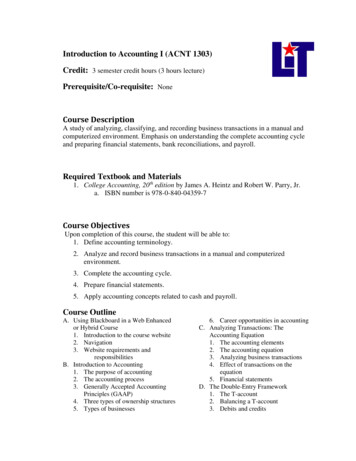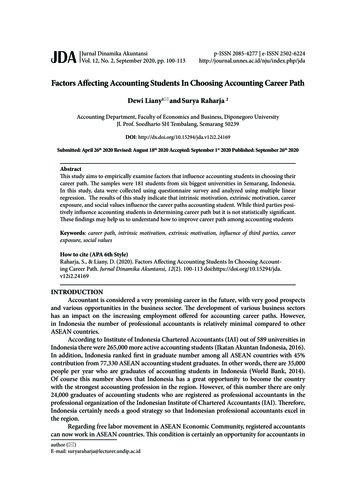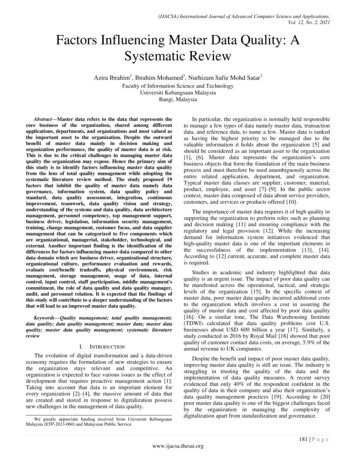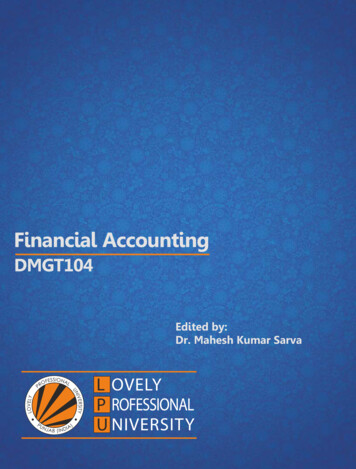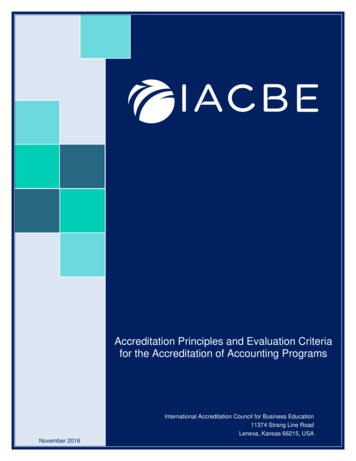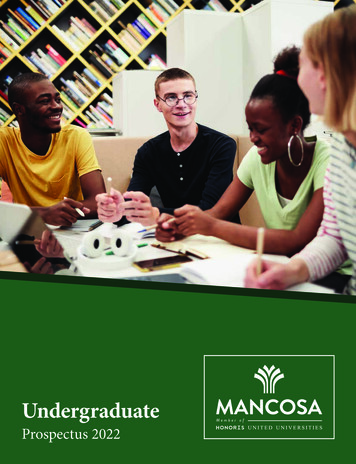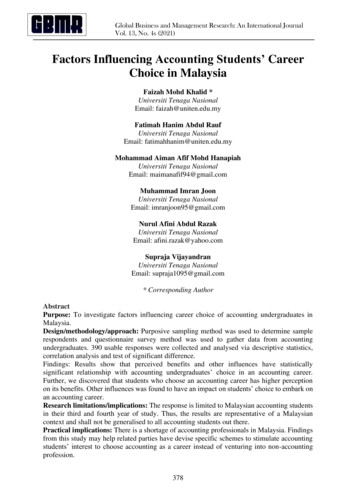
Transcription
Global Business and Management Research: An International JournalVol. 13, No. 4s (2021)Factors Influencing Accounting Students’ CareerChoice in MalaysiaFaizah Mohd Khalid *Universiti Tenaga NasionalEmail: faizah@uniten.edu.myFatimah Hanim Abdul RaufUniversiti Tenaga NasionalEmail: fatimahhanim@uniten.edu.myMohammad Aiman Afif Mohd HanapiahUniversiti Tenaga NasionalEmail: maimanafif94@gmail.comMuhammad Imran JoonUniversiti Tenaga NasionalEmail: imranjoon95@gmail.comNurul Afini Abdul RazakUniversiti Tenaga NasionalEmail: afini.razak@yahoo.comSupraja VijayandranUniversiti Tenaga NasionalEmail: supraja1095@gmail.com* Corresponding AuthorAbstractPurpose: To investigate factors influencing career choice of accounting undergraduates inMalaysia.Design/methodology/approach: Purposive sampling method was used to determine samplerespondents and questionnaire survey method was used to gather data from accountingundergraduates. 390 usable responses were collected and analysed via descriptive statistics,correlation analysis and test of significant difference.Findings: Results show that perceived benefits and other influences have statisticallysignificant relationship with accounting undergraduates’ choice in an accounting career.Further, we discovered that students who choose an accounting career has higher perceptionon its benefits. Other influences was found to have an impact on students’ choice to embark onan accounting career.Research limitations/implications: The response is limited to Malaysian accounting studentsin their third and fourth year of study. Thus, the results are representative of a Malaysiancontext and shall not be generalised to all accounting students out there.Practical implications: There is a shortage of accounting professionals in Malaysia. Findingsfrom this study may help related parties have devise specific schemes to stimulate accountingstudents’ interest to choose accounting as a career instead of venturing into non-accountingprofession.378
Global Business and Management Research: An International JournalVol. 13, No. 4s (2021)Originality/value: The findings provide new empirical evidence on factors influencingaccounting students’ career choice.Paper type: Research paperKeywords: Perceived benefits, Working environment, Other influences, Accounting, CareerIntroductionIt is common for students to decide on a career after graduating. More often than not, studentswill proceed to embark on a career based on their field of study. Nonetheless, we witnessstudents diverting from their original field of study for various reasons. Accounting studentsface similar issues when some of them decide not to join the accounting profession. Therefore,it is useful to discover factors influencing accounting students’ career choice.Research that focuses on factors influencing accounting students’ career choice in Malaysia isscarce. Some of these researches were by Jaffar et al. (2015) and Omar et al (2015). Theresearch discovered that salary was a major factor that influences student’s accounting careerchoice. This factor was also a variable revealed in a New Zealand research by Ahmed et al.(1997). They discovered that financial and market-related factors relating to employment suchas job prospects and security are some of the considerations.Working environment was another variable that was researched on. It include considerationssuch as job demands, resources and benefits bestowed to employees that creates loyalemployees (Carr et al., 2016). This indicate that working environment affects accountingstudents’ career choice (Omar et al., 2015). Further, flexibility of career options was found tobe the most important factor considered by accounting students in Hong Kong (Law, 2010). Insummary, accounting students choose a career in an accounting for its working environmentand standard of living, befitting a professional.Literature ReviewCareer ChoiceCareer choice is typically based on one’s skills, competencies, desire and ambition. In fact,deciding on a career requires a person to invest his time and effort to achieve the goal he setsout to achieve. This claim is supported by Germeijs and Verschueren (2006). They iterated thatonce a person divert from his goals, he would ultimately discontinue his studies. This researchin particular, looks at an accounting students’ career choice of either embarking on anaccounting profession or diverting to a non-accounting profession.In this study, career choice refers to pursuing either an accounting career path or a nonaccounting career path after graduation. An accounting career include jobs in the accounting,auditing, taxation or education fields; and a non-accounting career comprises of management,and other fields.One theory that covers career choice extensively is the Parson’s theory. The theory explainsthat a person considers personal expertise and capabilities when deciding on a career.Knowledge about the job scope, its market and compensation such as salary and incentives arealso important (Bandura, 1986). Nonetheless, there are other factors to be considered beforeone decides on a career. The mixture of various factors influences a person’s career decision.Perceived BenefitsPerceived benefits crucial in accounting students’ career choice are rewards, job availability,security, satisfaction, prestige and social status, promotion (Myburgh, 2005; Tan & Laswad2009). Further, prospective compensation is also considered important (Nelson et al., 2002).Other than that, career flexibility is another factor affecting career choice. However, Paolillo379
Global Business and Management Research: An International JournalVol. 13, No. 4s (2021)and Estes (1982) discovered that job satisfaction was not an important factor for an accountingcareer choice as compared to other professional groups. Nonetheless, Jackling and Calero(2006) found that high remuneration was not a driving force for a student to start an accountingcareer in Australia, but the driving force will be more apparent as the student climb up theemployment ladder. In Malaysia, a fresh graduate would be grossing a very competitiveremuneration package as compared to other business graduates.Two of the most prominent factors influencing students’ career choice are prestige and socialstatus (Malgwi, Howe & Burnaby, 2005). They discovered that career advancement, jobsecurity, competitive remuneration package, prestige and varied career options were the mainattractions of an accounting career. Hence, the research hypothesise that:H1: There is significant relationship between perceived benefits and accounting student’scareer choice.Working EnvironmentMoy and Lee (2002) define working environment as a safe and comfortable place where anemployee works. Singh et al. (2011) revealed that people are concerned about workingexperiences, workplace than earning a living. They claim that satisfaction of workingenvironment is associated with job fulfilment. Moy and Lee (2002) concluded that workenvironment a vital factor that affects an undergraduate’s career.Additionally, decision to resign and organisational commitment are found to be influenced byworking environment (Carlopio, 1996). Tan and Laswad (2009) established that challengingand dynamic environment at the workplace influences accounting students’ career choice.However, Wells and Fieger (2005) uncovered that a challenging environment negativelyinfluence career choice. Nonetheless, Boone, Olffen and Roijakkers (2004) discovered thathigh-performing students prefer working in a challenging and uncertain environment. On theother hand, Chan and Ho (2000) suggest that only weak students were concerned about theirworking environment. Thus, the hypothesis generated is:H2: There is significant relationship between working environment and accounting student’scareer choice.Other InfluencesReference group influence on a fresh graduate career choice is important. It was discoveredthat close relatives and their occupation, educators, counsellor and peers may influence astudent’s career choice (Pimpa, 2004; Byrne, Willis & Burke, 2012; Mauldin, Crain & Mounce,2000). Mauldin et al. (2000) pointed out that parents have a strong influence on students’ careerchoice. A parent who is a high-income earner working for a reputable company would expecttheir children to be like them or be better than them. For instance, Jackling et al. (2012) assertthat parents influence their child’s career choice, through by their parent’s life, educationalbackground and other factors. Nevertheless, Oyebode (1980) believes that career choice is notinfluenced by parental guidance but is based on individualism.Additionally, Talton & Simpson (1987) inform that peers affects career choice, while Pereiraand Garcia (2007) argue that friends provides emotional support in the process of career choice,whilst family pose as an important support. Therefore, the hypothesis generated is:H3: There is significant relationship between the other influences and accounting student’scareer choice.The above association between perceived benefits, working environment and other influenceswith career choice is depicted in Figure 1.380
Global Business and Management Research: An International JournalVol. 13, No. 4s (2021)Perceived benefitsH1Working environmentH2Career choiceH3Other influencesIndependent VariablesDependent VariableFigure 1: Schematic DiagramMethodsPopulation and SamplingThe targeted population for the research were third and final year accounting undergraduates.These students would have completed over half of their accounting course, have knowledge ofan accountant’s job and be able to decide on their career path.Data Collection ProceduresPurposive sampling method was for data collection. The sample is restricted to people who cangive the desired information, because either they fit in with some criteria set by the researcher,or they are the only ones who have it (Sekaran & Bougie, 2013).The questionnaire survey was adapted from Myburgh (2005). It consists of two sections.Section 1 covers demographics of the respondents consisting of gender, age, university,cumulative grade point average (CGPA), year of study and career choice. Section 2 coversquestions adapted from Myburgh (2005), analysing factors influencing accounting students’career choice.The questionnaire was tested for consistency prior to distribution to the respondents. Alphascore of perceived benefit, working experience and other influences were .84, .876 and .890respectively, indicating high reliability (Field, 2009).We distributed hardcopies to respondents from UNITEN and disseminated Google Form linkto respondents of other universities via snowball technique. 390 completed and usable sampleswere successfully collected. This amount is an acceptable number of samples to be analysed(Morgan & Krejcie, 1970; Sekaran & Bougie, 2013).Variables MeasurementThe two measurement scales used were nominal for career choice (dependent variable) andLikert scale for all independent variables. We used nominal scale of 1 for Accounting studentsand 2 for Non-Accounting career choices. A 5-point Likert scale of 1- not at all important to 5extremely important were used for both perceived benefits and working environment variables,while other influences variable uses 5-point Likert scale of 1-no influence at all and 5-stronginfluence.FindingsDemographic AnalysisTable 1 depicts the demographics of the respondents based on gender, age range, CGPA, yearof study and career choice.381
Global Business and Management Research: An International JournalVol. 13, No. 4s (2021)Table 1: Demographic Analysis (n 390)Freq.%9529524.076.0Cumulative Grade Point Average (CGPA):Below Average (0-2.00)1Average (2.01-3.00)90Good (3.01-4.00)2990.323.076.7Career Choice 139Age21-23 years old24 years old & aboveYear of Study:3rd Year4th YearFreq.%3513990101682224357Table 1 depict that majority of the respondents (76%) are female, while 24% of the respondentsare male. The respondents came from eight public and private universities: UNITEN, UiTM,MMU, UPM, IIUM, UUM, UKM and USIM. 168 respondents (43%) were in their 3rd year ofstudy and the rest were from the fourth year (57%). Further, 90% of the respondents werewithin the 20-23 age range, while the other 10% were 24 years and older. 76% of the studentswere above average (CGPA of 3.00 and above). Further, it was found that 77% of therespondents chose an accounting profession and the other 23% decided on a non-accountingprofession.Normality TestThe Kolmogorov-Smirnov test shows that perceived benefits, working environment, otherinfluences and career choice were not normally distributed (p 0.05).Correlation AnalysisWe ran Spearman’s rho to test the association between career choice with perceived benefits,working environment and other influences. The results indicate that there is statisticallysignificant relationship between career choice with perceived benefits (p 0.05) and otherinfluences (p 0.01), while no significant association was found between career choice andworking environment (refer Table 2).Table 2: Correlation CoefficientCareer ChoiceSpearman’s rho(n 390)Perceived benefitsWorking environmentOther influences.113*.073.142**Correlation is significant at the 0.01 level (2-tailed).**Correlation is significant at the 0.05 level (2-tailed).*Result on perceived benefits is consistent with Ahmad et al. (2014), Gunawan et al. (2021),Hutaibat (2012) and Raharja and Liany (2020). The result indicate that perceived benefitsinfluence students’ choice to embark on an accounting profession (M 4.19). However, thisfinding is not consistent with Byrne et al. (2012) who revealed that accounting graduates seework-life balance, good citizenship and self-fulfilment to be more important. Additionally, ourresults was also inconsistent with Hsiao and Nova (2016) and Pratama (2017) who emphasisedthat power and prestige of the accounting profession did not influence accounting graduates’decision to pursue an accounting career.382
Global Business and Management Research: An International JournalVol. 13, No. 4s (2021)In terms of the working environment variable, our finding is consistent with previous literatureof Ng et al. (2013). According to them, accounting students with no practical experience maynot be able to visualise an accounting profession’s working environment. Our findings is alsoconsistent with Wells and Fieger (2005) who established from their research that workingenvironment has no significant effect to students’ career choice due to the perspective that thesociety hold to the need of a challenging environment.The results on significant association between other influences and career choice is supportedby Srirejeki et al. (2019) who found that other influence (peers) does affect a students’intention to pursue an accounting profession. Our result is also consistent with Much et al.(2014). They deduce that students depend on others to solve their problems. Further, a studyby Pereira and Garcia (2007) pointed out that family plays an instrumental role in a student’scareer choice process, in line with our result that indicate other influences impact students’career choice. Social support such as family members, close friends, people that the studentsadmire and respect; play an important part in the student’s career decision (Wasif & Nawab,2020). However, Gunawan et al. (2021) and Oyebode (1980) discovered contrasting results.For instance, Oyebode (1980) claims that parents have no effect on students’ career choices.Test of Significant DifferenceTest of significant difference (Mann-Whitney U test) was administered to investigate whetherthere is statistically significant difference of perceived potential benefits, working environmentand other influences based on career choice. The reason why this test was performed was toprovide comparisons of perceived benefits, working environment and other influences ofstudents who choose accounting and non-accounting career. Only perceived potential benefits(PBen) and other influences (OtherInf) show statistically significant different results based onstudents’ career choice. For example, the median perceived potential benefits is higher forstudents who chose an accounting career (U 8331.5, p 0.026). Mann-Whitney U test providedfurther evidence that those students who chose an accounting career recorded higher perceivedbenefits. Besides that, median other influences was also higher for students who choose anaccounting career (U 8780.0, p 0.005).Figure 2: Mann-Whitney U TestDiscussion and ConclusionThe correlation test and test of significant difference provide interesting findings. For example,result indicate that perceived benefits influence students’ choice to embark on an accountingprofession (M 4.19). Mann-Whitney U test provided further evidence that those students whochose an accounting career recorded higher perceived benefits. This denotes that accounting383
Global Business and Management Research: An International JournalVol. 13, No. 4s (2021)students consider the accounting profession as one that provides benefits to them such asprestige, lifestyle and social status, future high earnings potential, possibility of career growthand promotion. However, our finding is not consistent with findings from Byrne et al (2012)who discovered that accounting graduates finds work-life balance, good citizenship and selffulfillment to be more important. Additionally, our results was not consistent with Hsiao andNova (2016) and Pratama (2017) who emphasised that power and prestige of the accountingprofession did not influence accounting graduates’ decision to pursue an accounting career.We then can conclude that majority of the accounting students’ career choice is driven byextrinsic benefits than intrinsic benefits.Further, we found that working environment does not influence career choice. A student withno working experience in an accounting field will not be able to visualise the workingenvironment of a person in the accounting field, as mentioned by Ng et al. (2013). Thesestudents will not be able to imagine the actual working conditions and do not understand acompany’s corporate culture.Finally, we conclude from our result that other influences may affect a student’s career choice,which is in contrast to findings from Gunawan et al. (2021) and Oyebode (1980). For instance,Oyebode (1980) claims that parents have no effect on students’ career choices. Nevertheless,our result is consistent with Much et al. (2014). They claim that students depend on others tosolve their problems. A study by Pereira and Garcia (2007) pointed out that family plays aninstrumental role in a student’s career choice process, in line with our result that indicate otherinfluences impact students’ career choice. Social support such as family members, closefriends, people that the students admire and respect; play an important part in the student’scareer decision (Wasif & Nawab, 2020). Therefore, we conclude that other influences doesaffect students’ career choice, which may be associated with their Gen Y attribute. Elayan andShamout (2020) reveal that Gen Y thrives from having close relationship with others.Theoretical ImplicationsThis study is relevant in enriching the current literature, particularly in a Malaysia setting whichlooks into accounting students’ career choice. Our findings provided mixed results as comparedto prior research for various reasons such as current perceptions of students, the student’snationality and background and so forth. Further, although there are scores of literature thatlooks into determinants of student’s career choice, they are predominantly of non-Malaysiacontext thus results may not reflect accounting students in a Malaysia’s perspective.Practical and Social ImplicationsAcademic advisors appointed to accounting students and universities should inculcateawareness, provide exposure to the students via engagement with accounting firms. Thereshould also be events held regularly with the accounting professional bodies such as MIA,CIMA and ACCA to enhance students’ awareness and provide an up-to-date information ofthe accounting profession.Universities should also proactively collaborate with professional bodies and largeorganisations by setting up mentoring system, for instance. Adler and Stringer (2018) reportedthat mentoring system has been successful in an Australian university, where it helpundergraduate students have better understanding of the accounting profession; theirresponsibilities and it actually helped the university integrate their academic curriculaaccording to profession needs.384
Global Business and Management Research: An International JournalVol. 13, No. 4s (2021)Limitations and recommendation for future researchThe first limitation of this research is the disparity in responses, where respondents weremajority female (over 70%). The respondents’ answers may be biased based on femaleperception, as evidenced by Lobato et al. (2014). They claim that female respondents’ decisionare more influenced by friends and family than their male counterparts when faced withimportant decision-making situations are. Thus, future research that consist of a balancebetween male and female respondents may reduce the possibility of biasness.Next, is the sample size. While the sample size collected was above the minimum threshold torepresent the population, more responses would offer enhanced assessment of accountingstudents’ career choice. Future research may aim to increase the number of responses asrepresentation of accounting students in Malaysia.Finally, the respondents are accounting students residing in Malaysia. Thus, results arerepresentation in a Malaysian context. However, similar research can be conducted in othercountries to elicit responses and comparison of the results can be used to better understand thefactors affecting accounting students’ career choice.AcknowledgmentWe would like to thank UNITEN’s iRMC who funded the research and provided us theopportunity to share our findings in this conference.ReferencesAdler, R., & Stringer, C. (2018). Practitioner mentoring of undergraduate accounting students:helping prepare students to become accounting professionals. Accounting & Finance,58(4), 939-963.Ahmad, Z., Ismail, H. & Anantharaman, R.N. (2014). To be or not to be: An investigation ofaccounting students’ career intentions. Education Training, 57(3), 360–376.Ahmed , K., Alam, K., & Alam, M. (1997). An Empirical Study of Factors AffectingAccounting Students' Career Choice in New Zealand. Accounting Education: AnInternational Journal, 6(4), 325-355.Bandura, A. (1986). Social Foundation of Thought and Action: A Social Cognitive View.Boone, C., Olffen, W., & Roijakkers, N. (2004). Selection on the Road to a Career: Evidenceof Personality Sorting in Educational Choice. Journal of Career Development, 31(1), 6178.Byrne, M., Willis, P., & Burke, J. (2012). Influences on School Leavers’ Career Decisions –Implications for the Accounting Profession. The International Journal of ManagementEducation, 10(2), 101-111.Carlopio, J. (1996). Construct Validity of a Physical Work Environment SatisfactionQuestionnaire. Journal of Occupational Health Psychology, 1(3), 330-344.Carr, E., Hagger-Johnson, G., Head, J., Shelton, N., Stafford, M., Stansfeld, S., & Zaninotto,P. (2016). Working Conditions as Predictors of Retirement Intentions and Exit from PaidEmployment: A 10-Year Follow-up of the English Longitudinal Study of Ageing.European Journal of Ageing, 13(1), 39-48.Chan, S., & Ho, S. (2000). Desired Attributes of Public Accounting Firms in the Job SelectionProcess: An Empirical Examination of Accounting Graduates Perception. AccountingEducation, 9(4), 315-327.Elayan, M. B., & Shamout, M. D. (2020). Measuring Gen Y’s attitude toward perceivedhappiness at workplace from undergraduates perspective in North Cyprus universities.International Journal of Advanced Science and Technology, 29, 2261-2274.Field, A. (2009). Discovering statistics using SPSS, Sage Publications Ltd, London.385
Global Business and Management Research: An International JournalVol. 13, No. 4s (2021)Germeijs, V., & Verschueren, K. (2006). High School Students’ Career Decision-MakingProcess: Development and Validation of the Study Choice Task Inventory. Journal ofCareer Assessment, 14(4), 449-471.Gunawan, H., Nisa, A., & Afrina, Y. (2021). Minat Jalur Karir Akuntansi dari PerspektifMotivasi Intrinsik, Ekstrinsik, Orang Ketiga dan Eksposur Karir. Akuntabilitas, 14(1), 112.Hsiao, J., & Nova, S. (2016). Generational Approach to Factors Influencing Career Choice inAccounting. Revista Contabilidade & Finanças, 27(72), 393-407.Hutaibat, K.A. (2012). Interest in the management accounting profession: Accountingstudents’ perceptions in Jordanian universities. Asian Social Science, 8(3), 303 – 316.Jackling, B., & Calero, C. (2006). Influences on Undergraduate Students Intentions to BecomeQualified Accountants: Evidence from Australia. Accounting Education: AnInternational Journal, 15(4), 419-438.Jackling, B., Lange, P., Phillips, J., & Sewell, J. (2012). Attitudes towards Accounting:Differences between Australian and International Students. Accounting ResearchJournal, 25(2), 113-130.Jaffar, N., Ismail, N., & Md Zahid, S. (2015). Determinants of the Accounting Students'Preference to Practice as Chartered Accountant in Malaysia. Accountancy Business andthe Public Interest, 43-59.Krejcie, R. V., & Morgan, D. W. (1970). Determining sample size for research activities.Educational and Psychological Measurement, 30(3), 607-610.Law, P. (2010). A Theory of Reasoned Action Model of Accounting Students' Career Choicein Public Accounting Practices in the Post-Enron. Journal of Applied AccountingResearch, 11(1), 58-73.Lobato, L., Bethony, J. M., Pereira, F. B., Grahek, S. L., Diemert, D., & Gazzinelli, M. F.(2014). Impact of gender on the decision to participate in a clinical trial: a cross-sectionalstudy. BMC Public Health, 14(1), 1-9.Malgwi, C., Howe, M., & Burnaby, P. (2005). Influences on students' choice of college major.Journal of Education for Business, 80(5), 275-282.Mauldin, S., Crain, J., & Mounce, P. (2000). The Accounting Principles Instructor's Influenceon Students' Decision to Major in Accounting. Journal of Education for Business, 75(3),142-148.Moy, J., & Lee, S. (2002). The Career Choice of Business Graduates: SMEs or MNCs? CareerDevelopment International, 7(6), 339-347.Much, K., Wagener, A.M., Breitkreutz, H.L. and Hellenbrand, M. (2014). Working with themillennial generation: Challenges facing 21st-century students from the perspective .xMyburgh, J. (2005). An Empirical Analysis of Career Choice Factors that Influence First-YearAccounting Students at the University of Pretoria: A Cross-Racial Study. MeditariAccountancy Research, 13(2), 35-48.Nelson, I., Vendrzyk, V., Quirin, J., & Allen, R. (2002). No, the Sky Is Not Falling: Evidenceof Accounting Student Characteristics at FSA Schools, 1995–2000. Issues in AccountingEducation, 17(3), 269-287.Ng, L. C., Chong, H. O., H’ng, C. K., Khor, P. H., & Ng, S. V. (2013). Factors affecting jobselection preferences of accounting students in Malaysian universities. Unpublishedmanuscript. Faculty Of Business And Finance Department Of Commerce &Accountancy, UTAR.386
Global Business and Management Research: An International JournalVol. 13, No. 4s (2021)Omar, M. K., Zakaria, A., Ismail, S., Sin, J., & Selvakumar, V. (2015). Job SelectionPreferences of Accounting Students in Malaysian Private Universities. ProcediaEconomics and Finance, 31, 91-100.Oyebode, M. (1980). The Influence of Parental Education on the Level of VocationalAspiration of Class Three and Four Students of Lagos Area. In Nigerian PsychologicalConference.Paolillo, J., & Estes, R. (1982). An Empirical Analysis of Career Choice Factors amongAccountants, Attorneys, Engineers and Physicians. The Accounting Review, 57(4), 785793.Pereira, F., & Garcia, A. (2007). Friendship and Career Choice: a Study with Private and PublicSchool Students. Revista Brasileira de Orientacao Profissional, 8(1), 71-86.Pimpa, N. (2004). The Relationship Between Thai Students’ Choices of InternationalEducation and Their Families. International Education Journal, 5(3), 352-359.Pratama, A. (2017). Why do accounting students choose a career in accountancy? Anexploratory study in Bandung City, West Java, Indonesia. Review of Integrative Businessand Economics Research, 6(2), 393-407.Raharja, S., & Liany, D. (2020). Factors Affecting Accounting Students in ChoosingAccounting Career Path. Jurnal Dinamika Akuntansi, 12(2), 100-113.Sekaran, U., & Bougie, R. (2013). Research Methods for Business: A Skill Building Approach(6 ed.). Chichester: John Wiley & Sons.Singh, P., Bhandarker, A., Rai, S., & Jain, A. (2011). Relationship Between Values andWorkplace: An Explanatory Analysis. Facilities, 29(11/12), 499-520.Srirejeki, K., Supeno, S., & Faturahman, A. (2019). Understanding the intentions of accountingstudents to pursue career as a professional accountant. Binus Business Review, 10(1), 1119.Talton, E., & Simpson, R. (1987). Relationships of Attitude Toward Classroom Environmentwith Attitude Toward and Achievement in Science Among Tenth Grade BiologyStudents. Journal of Research in Science Teaching, 24(6), 507-525.Tan, M., & Laswad, F. (2009). Understanding Students' Choice of Academic Majors: ALongitudinal. Accounting Education: An International Journal, 18(3), 233-253.Wasif, S., & Nawab, M. M. (2020). Significance of perceived social support for career decisionself-efficacy - A co-relational study. Foundation University Journal of Psychology, 4(2),75-82.Wells, P., & Fieger, P. (2005). Accounting: Perceptions of Influential High School Teache
accounting career path after graduation. An accounting career include jobs in the accounting, auditing, taxation or education fields; and a non-accounting career comprises of management, . The respondents came from eight public and private universities: UNITEN, UiTM, MMU, UPM, IIUM, UUM, UKM and USIM. 168 respondents (43%) were in their 3rd .
